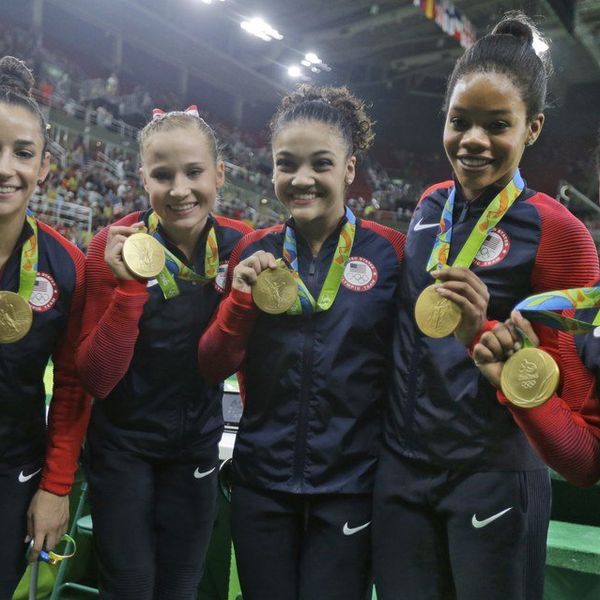Who would have thought that gold medals and colonial invasion are tied together in China’s perception of the Olympics?
In recent years, China’s involvement in the Olympic Games has been nothing short of controversy. During 2008 Beijing Olympics, protests erupted around the world regarding China’s spotty human rights record and disrupted the torch relays. At the 2012 London Olympic Games, Xinhua News Agency (the largest new agency in China) responded furiously to an American commentator’s remark that a Chinese swimmer’s world-record performance was “disturbing”; the motivation behind this remark, according to Xinhua, was that “America cannot accept China’s rise.”
Yet nothing could have prepared us for controversies surround Chinese athletes during this year’s Olympic Games, when, just a day into the Games, Australian swimmer Mack Horton called his Chinese opponent Sun Yang a “drug cheat,” in reference to a 2014 doping suspension, shortly before narrowly beating him for the 400-meter freestyle gold medal.
After Australia’s chef de mission Kitty Chiller refused to issue an apology, and a tearful Sun Yang accused Horton of playing mind games at a press conferences, Chinese netizens and even state media took it upon themselves to counterattack. On Sina Weibo (China’s Twitter-like microblogging platform), users lashed out at Horton, calling him “jealous of China’s success” and “racist”; meanwhile, those able to circumvent the Great Firewall posted angry comments on his Facebook page. The Chinese swim team quickly issued a statement that accuses Horton of “hurting the feelings” of Chinese people, a phrase frequently employed by Chinese official institutions and state media to express displeasure, annoyance and outrage.
It may come across as bizarre and even petty for international audiences to see Chinese media and general public react so strongly, yet the truth is, China’s fierce pride surrounding its athletic performance is not a single, isolated phenomenon – it is, in fact, profoundly ingrained in the historic narrative of “national humiliation” – in other words, of the humiliating, shameful nature of China’s “suffering” at the hands of western, “imperialist” powers, until recently, when the Communist Party of China (CCP) “liberated” us all. Such narratives were created by the CCP shortly after the failure of Mao’s Cultural Revolution, and served to reunite the nation under a national identity that is defined by failure rather than success.
In schools, museums, lectures, television programs and even social media, Chinese people are taught that their recent history has been one of fallen glory – the corrupt, weak Qing Dynasty became victim to western imperialist powers that banded together, raided China and turned its cities into colonies. Then came along the Japanese – those who robbed, murdered and raped their way across China, until the Communist Party was able to defeat them, restore order, and truly liberate the proletariat masses of China.
Such was the narratives that were repeated to me – and the vast majority of my classmates – when we were just children. We learnt early on in school that western powers were jealous of China’s rise and would relentlessly attack us; during class trips to museums we watched documentaries surrounding the horrific atrocities committed during the Sino-Japanese Wars and the Opium Wars; after school, kids like me were fascinated by historical dramas portraying the fall of the Qing Dynasty and the ruthless Japanese invaders. On special occasions, such as anniversaries of important battles in China’s conflicts with other countries, we listened to speeches that implore us to consider the humiliation of our nation and the responsibilities each of us had to bear to restore China’s former glory. Our parents and grandparents affirmed these claims by telling us their own personal struggles and how proud they were of China’s current economic prosperity. I was raised and educated with pain, disgrace and humiliation ingrained in my pathos.
Sports are no exception to a national narrative of shame and humiliation; economic development aside, athletic performance became another crucial indicator of China’s apparent recovery from “humiliation” (thanks to the CCP, of course). Gold medals are seen as not only individual achievements of athletes, but rather glories of the entire country that also legitimize CCP rule. Under the current system, athletes are separated from their peers at a young age, attend special sports academies, receive government subsidies and are carefully monitored even in their personal lives.
In his book Never Forget National Humiliation, Professor Wang Zheng of Seton Hall University explains how Beijing's extravagant hosting of the 2008 Olympics and its record medal haul (China bested the United States for the first time ever) played into this narrative:
“It is because of the lingering memory of national humiliation that the Chinese government and the Chinese Communist Party (CCP) elite can legitimize their rule through sports. Gold medals in international sports have been effectively used as the currency of CCP legitimacy. Comparing today’s achievements with that of old China, as in the article “From ‘Sick Man of East Asia’ to ‘Sports Big Power,’” has been a common method of the CCP propaganda machine. It is a great achievement for China to go from just one participant and no medals in 1932 to 100 medals and 51 golds in 2008. The success of the CCP government and China’s rejuvenation in power and wealth can be illustrated by the world-leading count of 51 gold medals.”
So, it is perhaps not so surprising, after all, that so many Chinese people are upset or even offended at less-than-flattering remarks made by athletes or commentators from other countries. Behind every gold medal is a nation of people, entrenched in profoundly intense and conflicting feelings of humiliation and pride. Hopefully, with the increasing number of gold medals obtained by Chinese athletes, as well as the unconventional popularity of “meme girl” Fu Yuanhui and an Olympic proposal between two Chinese athletes, the Chinese audience and state media may be finally relaxing a bit and just enjoying the Olympic spirit.





















